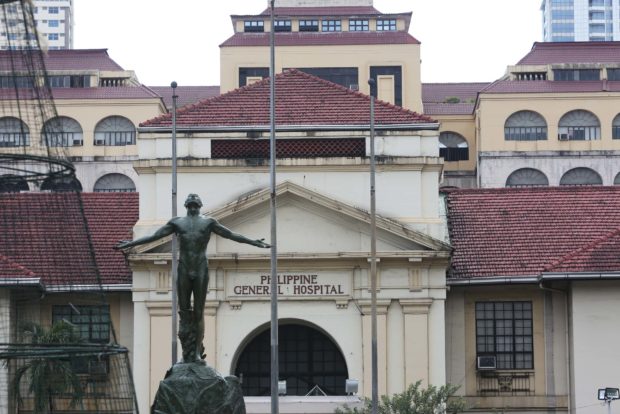PGH stops accepting nonlife-threatening cases as COVID-19 cases surge
MANILA, Philippines — The country’s biggest COVID-19 referral facility had to temporarily shut its doors to nonlife-threatening cases to accommodate more COVID-19 patients after new infections filled up the hospital’s bed capacity.
However, the Philippine General Hospital (PGH) said it would still accept life-threatening emergency cases, while its Department of Ophthalmology and Visual Sciences as well as the Cancer Institute would remain open.
The hospital would likewise be reducing further its surgical operations starting Aug. 19, according to an advisory to its specialty physicians.
The PGH had 262 COVID-19 patients admitted as of Aug. 14, or way past the 250-bed capacity,its spokesperson, Dr. Jonas del Rosario, said in a radio interview on Sunday.
All 40 beds at the intensive care unit were also occupied.
Article continues after this advertisementIn a Viber message, Del Rosario said restricting outpatient services would allow them to repurpose and open additional 50 COVID-19 beds.
Article continues after this advertisementDwindling supply
“We ask for patience and understanding for us to better respond to the increasing number of COVID (cases). We will advise as soon as the surge eases,” the PGH said in its Aug.14 public advisory.
Del Rosario said the PGH still has enough oxygen, but its supply of the drug tocilizumab was dwindling. It is generally used to treat severe diseases induced by COVID-19.
“We need to restock. We have [already] placed additional orders,” he said.
Elsewhere in Metro Manila and adjoining provinces, private hospitals were also running low on its supply of the COVID-19 treatment drug, said Dr. Jose Rene de Grano, president of the Private Hospitals Association of the Philippines.
P25,000 per vial
In a separate interview, De Grano said tocilizumab suppliers have run out of stock during the past two weeks.
“The government [anyway] is saying that it has enough supply (of tocilizumab). It’s also very expensive, imagine P25,000 per vial,” De Grano said.
He said severe and critical COVID-19 patients were normally treated with the antiviral drug remdesivir and given tocilizumab if they failed to respond to the first treatment.
De Grano said most facilities in Cavite, Laguna, Batangas, Rizal and Quezon have also reached their full COVID-19 bed capacity.
In Imus City, Cavite, for instance, Ospital ng Imus said COVID-19 patients would have to be attended to by the physician inside their vehicles or outside the emergency room because the hospital’s emergency department and ward were already full.
For more news about the novel coronavirus click here.
What you need to know about Coronavirus.
For more information on COVID-19, call the DOH Hotline: (02) 86517800 local 1149/1150.
The Inquirer Foundation supports our healthcare frontliners and is still accepting cash donations to be deposited at Banco de Oro (BDO) current account #007960018860 or donate through PayMaya using this link.















